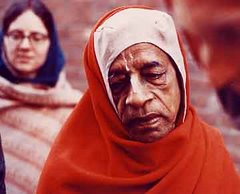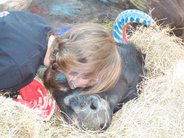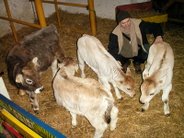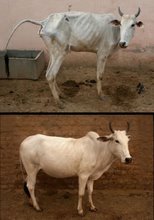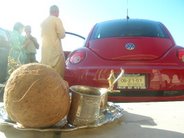By Brij Khandelwal. Uttar Pradesh, India
The much-hyped and long-awaited campaign to remove stray animals from urban
areas in Agra has been stalled by complaints from animal activist Maneka
Gandhi.
In a series of complaints to the Uttar Pradesh chief secretary, Agra
divisional commissioner and other officials, Gandhi has accused Agra
Municipal Commissioner Shyam Singh Yadav of ordering 'the mass killing of
dogs', a charge vehemently denied by Yadav.Gandhi has also accused the
municipal commissioner of 'planning to kill all monkeys, donkeys and cows to
make Agra completely animal-free'.
'The experiment to relocate monkeys had not succeeded anywhere in India. In
Vrindavan they had tried this experiment and all the monkeys perished. Delhi
also tried to relocate the monkeys in the Bhatti mines; more than 600 died.
'If the authorities in Agra want to kill them let them say so. Before
transporting the monkeys, a proper survey of the area and the forest should
be done to make sure they had enough to eat there and the facilities
available could sustain them,' Gandhi told IANS.
Ravindra Choudhary, head of the Animal Husbandry Department of the Agra
Municipal Corporation, said: 'People are being bitten by monkeys daily.
Unfortunately, there are no medical facilities available for treatment and
no anti-rabbies vaccines. And how can the poor afford treatment?'
According to Choudhary, there are more than 10,000 monkeys in Agra but an
animal welfare NGO estimates that there are close to 50,000 monkeys and they
seem to be multiplying at a fast rate.
In 1996, the Supreme Court had ordered that dairies should be shifted
outside the city and several directives were subsequently issued on the same
order. The Uttar Pradesh government had also issued a gazette notification
in 2002 to control animal population and capture stray animals.
Yadav said that the registration of all pet animals has now been made
mandatory. 'I am also looking for a suitable design to prevent littering on
the roads by horses deployed to haul carriages. The excreta of horses would
be collected in a leather bag and then disposed of,' he added.
Although Maneka's initiative has for the moment halted all projects to rid
the city of stray animals, Mukesh Jain, the private financer of the 'Catch
the Monkeys' campaign, said that he would go ahead with the drive in the
last week of July.
'We are following the rule book and there is nothing illegal about it. The
charge of killing the animals is baseless. The animal lovers are free to
feed the monkeys in the jungle. But why allow the monkeys to bite human
beings?' he asked.
In her letter to the Agra divisional commissioner, Gandhi said, 'Street dogs
and cattle forage in the garbage, cleaning it of all organic waste. In their
absence uncollected garbage will rot and smell.
'India has a long tradition of peaceful coexistence with animals. What makes
our cities special is that we share them freely with animals. To remove
animals from a city leaving only the sterility of cars and buildings in a
foolish aping of the west is to destroy the city's character and soul.
'The Agra-Vrindavan-Mathura area holds a special sentiment for all Indians
as the place of the cowherd god Krishna. Would we rid his place of cows or
any other creatures?'
Locals want all stray animals, including dogs and cattle rounded up, and the
monkeys killed or transported to some other location.
'Due to the fear of monkeys we have not had the courage to sleep on our
terraces in this hot weather. Women can't go to the roof tops and spend some
time there in the cold winter months as these monkeys target children and
young women,' said Bankey Lal, a shopkeeper.
'It's not a happy situation to be in,' said Mukesh Jain. He has already
spent quite a lot of money on catching monkeys and is willing to finance the
drive till the last monkey has been dispatched to the forest.
The municipal corporation wants a drastic reduction in the number of
animals. Gandhi has suggested sterilisation of dogs by her organisation
People for Animals (PFA) as she thinks this would be a more humane approach
to the problem.
Vasudha Mehta of the NGO Wildlife SOS, which runs a rescue centre for sloth
bears in Agra, suggests a rescue centre for monkeys. 'Let's work on some
netted enclosure with electric fencing on the river bank. Put all the
monkeys there and feed them at one point.
'Obviously, it is a very tricky problem, all the more because of people's
religious sentiments. So we must work on some innovative ideas and
technologies in the interest of the human race,' she said.
 Excerpt from the Working Villages International website
Excerpt from the Working Villages International website